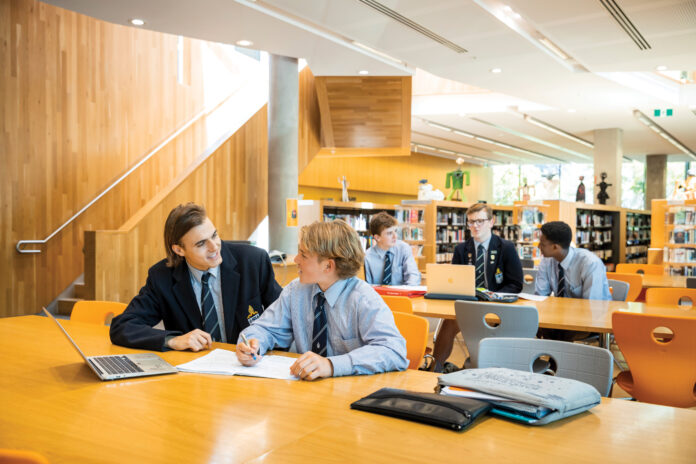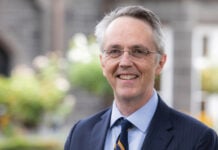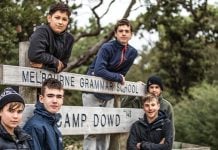Like many aspects of the School’s programme, the leadership model employed at Melbourne Grammar School has evolved in line with societal norms and expectations.
The notion of gratitude and ‘giving back’ continues to be an important dimension of our current understanding of leadership. However, over the past five years or so, it has become more nuanced with ‘followership’ – where individuals collectively contribute to the achievement of a shared goal – and ‘leading by demonstration’ (or role modelling) complementing this approach.
We now appreciate that all students are well placed to demonstrate leadership qualities and contribute to the culture within the School.
Senior School Student Committees are a good demonstration of this approach in action, where students with common interests work together towards mutual goals. The Committees comprise a Chair (or two Co-Chairs), a Secretary and (self-nominated) Committee members who, together with a staff mentor, normally collaboratively manage aspects of their affairs, including setting their annual priorities.
Here are two examples of Student Committees making a difference.
2019 Student Committees
- The Arts Committee
- Bluestone Committee
- Chapel Committee
- GSA (Gay Straight Alliance)
- House Activities Committee
- LGR (Leslie Gladstone Robertson Society)
- Politics Committee
- Science and Technology Committee
- SLIC (Sustainable Living Improvement Committee)
- Reconciliation Committee
- Values in Action Committee
Bluestone Committee
The Bluestone Committee was established in 2018. While it is fair to say its academic agenda is still evolving, the Committee has already made an impact through a student led initiative.
The Student to Student Tutoring Programme operates twice a week in the Nigel Peck Centre for Learning and Leadership (CLL) after classes have ended for the day. Introduced in 2019, the programme is organised by Bluestone Committee members, with designated Year 11 students providing academic support to mostly younger students on an ‘as needs’ basis.
“The tutoring usually involved a boy coming up to a tutor and saying, for example, they can’t solve a mathematics problem which had been set for homework. The tutor might help them work through the problem. It’s not about doing the problem for them,” explains Year 11 student and Committee Chair, Tom Bartlett. “However, we know some boys may not have the confidence to approach an older student, so sometimes tutors initiate the contact. We don’t want it be intimidating.”
“I think the programme has been successful in terms of future trajectory,” says Year 11 student and Committee Secretary, Bo Sargeant. “This year we wanted to begin to integrate the programme into the culture of the School. Over time we want it to become a more accepted thing that people do.”
The benefits of the programme extended beyond homework help. “I remember speaking to a boy new to the School. He hadn’t studied French before and wasn’t doing all that well in it. Probably the most help I could give him was not just helping him with his learning but also reassuring him about the benefits you get from studying a language, including the life skills it brings,” explains Tom. “Also, some boys won’t have an older brother to talk to, and this gives them an
opportunity to interact with an older boy in a meaningful way.”
There were also benefits for the tutors themselves. “I really found it fulfilling and enjoyable to be able to carry on the assistance I had informally received from older students in previous years,” says Bo.
“Our current focus is on supporting the academic culture of the School through the Student to Student Tutoring Programme,” says Tom. “Next year we are considering introducing Year 10 exam revision lectures and Old Melburnian speaker panels across specific career areas.”
Gay Straight Alliance
The purpose of the Gay Straight Alliance (GSA) is to promote a culture where all Senior School boys feel safe, supported and included, according to Year 11 student and GSA Chair, Ben Bonnici. “Lots of boys around our age are grappling with aspects of identity. It’s important that they feel accepted, no matter where they feel that they are in that self-discovery, whether it’s to do with sexuality or not,” he explains.
Established in 2016, with 40+ members drawn from Years 9 to 12 this year, the GSA is one of the largest student-led Committees in the Senior School.
“Leadership is about taking responsibility,” says Year 11 student and GSA Secretary, Archie Skinner. “Here, there’s a big mix of boys working together to achieve their unified goal, through events and other activities, but also by acting as strong role models.”
GSA staff mentor and Head of Enrichment Studies, Dr Martin Ball expands on this notion. “There are leadership opportunities for every Melbourne Grammar School student to play in relation to having an inclusive community.”
“It doesn’t matter if you are gay, straight or don’t quite know what you are, you can still do the right thing and set the right example,” he says. “That’s what we expect of every single student.”
Held annually since 2017, and organised by the GSA, Pride Week at Melbourne Grammar School aims to shine a light on the mental health issues that occur within the LGBTI community and the importance of acceptance and support.
In addition to the annual Pride Round football match with Brighton Grammar School, numerous activities were organised at the School this year. Speakers included Ms Rochelle Pattison and Mr Brooke Thorn, co-founder of the Equality Campaign, a broad coalition of Australians working to make sure LGBTI people are equal under the law.
The GSA is also keen for students to be aware of the support structures that exist at the School. “We have a great Counselling service at the School and I’d encourage boys to make use of it,” says Archie. “And while it might be daunting in some ways, talking to your closest friends can be really helpful.



